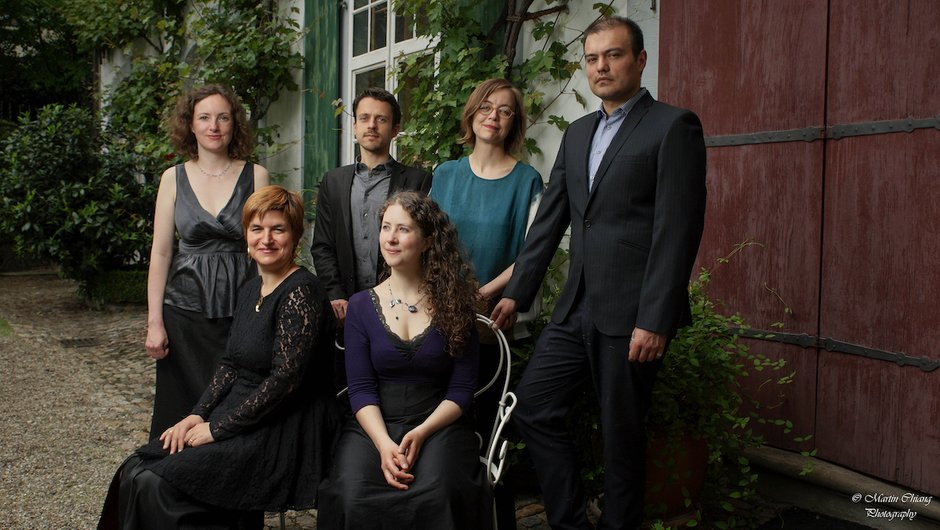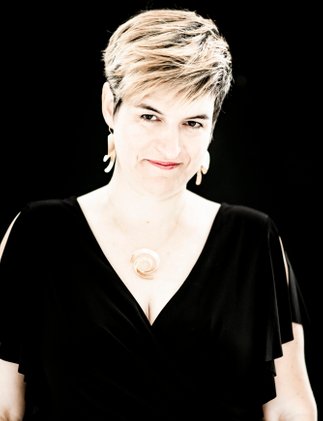

The German soprano, Monika Mauch, specialist in Early Music, studied with the bass-baritone Richard Wistreich in Trossingen. In numerous recordings and concerts world wide she has performed music of the early German baroque, working with ensembles like Philippe Pierlot's Ricercar Ensemble together with Jean Tubéry's wind group La Fenice, Cantus Coelln - Konrad Junghänel, Capella Ducale and Musica Fiata directed by Roland Wilson, Ensemble Weser-Renaissance directed by Manfred Cordes, Collegium Vocale Gent under Philip Herreweghe, Concerto Palatino with Bruce Dickey and Charles Toet, les Cornets Noirs with Frithjof Smith and Gebhard David. With the Ensemble Daedalus directed by Roberto Festa she has performed Italian Madrigals and polyphony, and for many years she’s been invited to Montreal by Matthias Maute with Ensemble Caprice, and to the Montreal Baroque Festival directed by Susie Napper. Her recordings: Morimur with the Hilliard Ensemble, a recording of Robert Dowland's collection The Musicall Banquet with Nigel North, which has also appeared on ECM, Neun deutsche Arien by Händel, Carus-Verlag, and a recording of French baroque cantatas for obligato hurdy-gurdy with the virtuoso Tobie Miller at ricercar.
Canadian violinist Ellie Nimeroski studied at McGill University in Montreal. She was a member of Arion Orchestre Baroque (dir. Claire Guimond) for ten years, and during this time she also played with Clavecin en Concert, La Bande Montréal Baroque, and Tafelmusik, in Toronto. With La Compagnie Musicale La Nef, she recorded the CD for the book Flûte de Flûte Victor with storyteller Suzanne De Serres (Éditions Planète Rebelle) and performed for many young audiences. An artist’s residency at Paris’ Cité Internationale des Arts brought her to Europe in 2014, and she now lives in Brussels where she performs with Anima Eterna Brugge, B’Rock Orchestra, and Ensemble Clematis. Her PhD thesis “A Bow’s-eye View” presents an imaginative investigation of bow maker François Xavier Tourte and violinist Giovanni Battista Viotti’s meeting in 1780s Paris.


Caroline Ritchie
A performer on all sizes of viol, medieval fiddle, lirone, and early cello, Caroline’s concert and recording career spans a wide spectrum of music, from the 15th to the 18th century and beyond.
As a soloist, she collaborates frequently with harpsichordist Ralph Stelzenmüller, and with viol player Henrik Persson and lutenist Lynda Sayce. A committed consort player, she co-founded the viol consort Newe Vialles (UK), plays regularly with Compass Consort and The Earle his Viols (Basel) and Musicke and Mirth (Berne), and has guested with Phantasm (London). Having made her home in the area, she can regularly be heard with other Basel-based ensembles including Ensemble Danguy (Tobie Miller), Ensemble Leones (Marc Lewon), &Cetera (Ulrike Hofbauer), Ensemble Arcimboldo (Thilo Hirsch), amongst others.
Orchestral work has included The New London Consort, Barokksolistene, the Dunedin Consort, the Hanover Band, the Academy of Ancient Music, and the Manchester Camerata.
Caroline studied at New College, Oxford, the Royal Academy of Music, and later at the Schola Cantorum Basiliensis, where her work was generously supported by the Leverhulme Trust. In London, she studied cello with Jenny Ward Clarke and viol with Richard Campbell, while in Basel her teachers included Paolo Pandolfo and Randall Cook. She was inspired by lessons and masterclasses with Sarah Cunningham, Rainer Zipperling and Wieland Kuijken.
From 2007-2019 she taught viol and consort playing at the Royal Academy of Music in London, later co-founding the annual South West Viols Festival in Culmstock, Devon (UK), a weekend of teaching and masterclasses. Her editions of 17th and 18th century music are published by Bärenreiter-Verlag, Breitkopf und Härtel, and Septenary Editions.
Caroline has the great good fortune to play on an original bass viol by John Pitts (London 1675), a 7-string viol built for her by Jane Julier in 2012, a renaissance viol after Ciciliano by Eduardo Gorr, and an anonymous mid-18th century German cello.
2022 © Danguy. All rights reserved. Impressum and data privacy statement